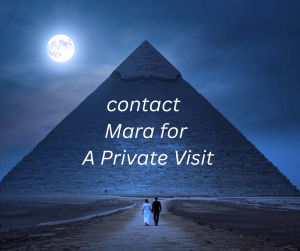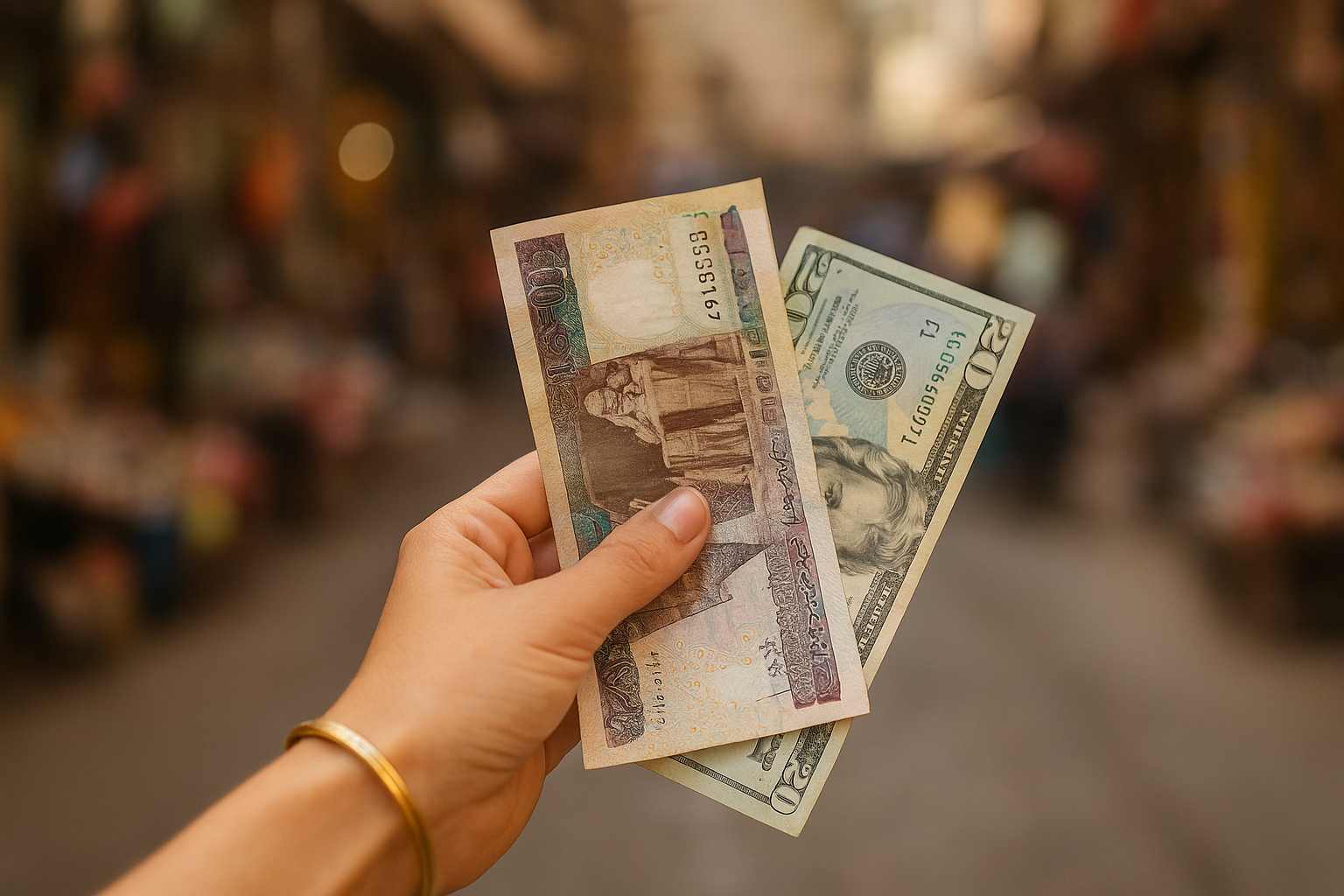Quick Answer – updated 31 Aug 2025.
Bring cash in your home currency (USD, EUR, GBP, AUD) and exchange it for Egyptian pounds after you arrive. Use pounds for daily expenses (snacks, taxis, tips) and keep some foreign cash for hotels or tours. Always carry both cash and a card for backup. Don’t bring coins — they’re useless here. Learn the one simple thing to never do at the airport exchange and the one time you SHOULD use card.
The Official Currency of Egypt is Egyptian Pound
Top Ten Tips on saving money in Egypt
- Don’t buy it before you travel because you will get a better exchange rate inside Egypt AND no exchange fees.
- Bring a good backup of your own currency if it is US dollars, EURO, British Pounds, Australian Pounds.
- You must have US$, EURO, British Pounds or AUS (these are the main ones) if you are getting your entry visa on arrival at the airports. Easiest thing to do is pay for entry visa with $100 and your change will be in egyptian pounds, enough to see you through the first few hours for tips, snacks, taxi etc.
- Bring new $100 bills as opposed to old or damaged.
- Don’t bring coins – get rid of them by stocking up on non-meltable snacks, books etc at the airport to lighten your pocket load.
- Change ONLY a little ($50) at the airport bank in the arrivals hall. After that use
- Exchange shop, ATM or bank to withdraw Egyptian pounds. Remember, cash is king in Egypt.
- Pay for your hotel and tours in the currency you were quoted.
- Pay with card for high cost items.
- Exchange money every few days to avoid having excess Egyptian pounds at the end of your stay.
- ATMS will give you back to back withdrawals
The reasons behind my Top Ten Tips based on over 20 years living in Egypt..
Using Dollars, Euros, Sterling
Hotels and big shops accept USD, EUR, GBP, AUD. But for taxis, water, and market stalls Egyptian pounds is best for you so you don’t get caught in the exchange rate.
There are some older dates on the US $100 bills that will not be accepted by egyptian banks or exchange shops so you need to bring new $100 bills and make sure none are damaged, they won’t be accepted either. Sometimes you might be asked to change one of those notes for a newer one or for egyptian money because the person can’t change it in Egypt but you can back home.

How to Get the Best Rate
- Exchange shops – they are EVERYWHERE (passport required, shorter lines than banks).
- ATMs (watch withdrawal limits — remember
- you can make back-to-back withdrawals. what I mean by this is that ATMs have withdrawal limits but most will let you make consequetive withdrawals there and then up to the limit your home bank allows.
- All ATMs do not have the same limits. The ones in the bank walls have higher limits than those in or outside hotels because it is easier to keep them full. There are a very few that will give you US dollar withdrawals but this is not the norm.
- Don’t leave ATM runs in your hotel until the morning because they can run out of cash and you don’t want to be using your foreign currency for small transactions during the day.
- Airport Banks – don’t change much money – maybe $50 at the airport bank because it can happen that their rate is slightly less to your advantage than the exchange shop rates and the exchange shops are everywhere.
- Visa & Mastercard: widely accepted in hotels/restaurants, rarely in small shops. Don’t use your card in any shop presenting you with old fashioned card copying service and don’t give your card to anyone to process in a back room or behind the counter. Always have cash backup. If you’ve already agreed a good price, be nice when switching to cash — just say you remembered you have it.
- AmEx: limited use.
- Contactless (Apple Pay, Google Pay): only in a few big places.
- Traders add fees for cards — expect ~3% more.
Paying for Accommodation
By law, hotels and tour operators should be paid in foreign currency. To avoid getting an unfavourable exchange rate it is best to pay for your accommodation in the currency you were quoted in. Before booking if you are quoted in a foreign currency you can always ask to be quoted in your home currency.
At Mara House, I usually quote in euros as it is the most stable currency but happily accept other majors (USD, GBP, AUD).
Don’t make a mistake in Egypt. Discover the critical questions most tourists never think to ask when booking online.
Small Change is Gold Dust
You’ll constantly need small notes (1, 5, 10, 20, 50 LE) for taxis, tips, and snacks. Hotels and banks rarely have them.
TIP: Ask small vendors (fruit sellers, bakers, juice stalls, these are normally not trying to make extra money from tourists and are happy to oblige) to break your notes because it also lightens their cash drawer.
Coins
Don’t bring foreign coins. Banks won’t take them. If locals show you foreign coins, they are not begging, they’re asking you to swap them for notes in Egyptian. But, the 1 LE coin looks a lot like the 1 Euro coin — if you decide to be helpful and change their coins – check the coins carefully.
Egyptian coins and especially the 1 LE coins – we all tend to empty our pockets at the end of the day and coins accumulate on our table tops rapidly. Remember to get rid of the Egyptian coins you have accumulated in the days before your departure.
See my full Travel Advice Hub for answers to all your questions on Egypt.
Card only for CERTAIN High Cost Buys.
This is very important
Here’s a currency tip almost nobody tells you: don’t assume that paying by card is best for everything expensive. But there is one time it is definitely worth it. When paying for items where you might feel a bit unsure—like high-end gold and silver jewellery.
Egyptian jewellery is stunning—but unless you’re carrying a jeweller’s magnifying glass, know the daily market price of gold and silver, and can weigh pieces precisely, there’s no way to be certain you’re not overpaying. Most gold here is 20–22 carat and often unhallmarked. Prices should be calculated on the metal’s weight, daily value, and the craftsmanship involved. That is how it is calculated for Egyptian customers.
A personal story: several years ago, I bought some plain gold bangles in Egypt. The lack of hallmarks worried me. Several local jewellers at home doubted they were real gold. I set them aside and tried not to think about it—until a trip to Dublin gave me the chance to check. At the Assay Office, I was relieved to learn they were indeed 22-carat gold. They even advised me to have them hallmarked myself—which I did.
I was lucky. But imagine buying a beautiful piece that breaks, gets damaged, or turns out to be lower quality than expected or worse still maybe only gold plated. Paying by card gives you a safety net. At least there’s a possibility of some chance for redress.
Practical Takeaway
Bring a mix of: foreign cash (USD/EUR/GBP/AUD), Egyptian pounds (get here), and one solid Visa/Mastercard. That’s your safest bet.

